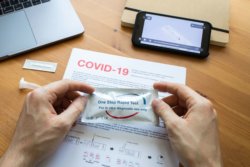November 23, 2020

The Future of Clinical Trials: Decentralized, Diversified, Efficient and Fast
COVID-19 is the most deadly and confounding world health crisis since the 1918 influenza pandemic which killed as many as 50 million people. Hopes for a better future hinge on the speedy development of effective vaccines and therapeutics. That imperative has brought the enormous challenges of vaccine development to public attention.
According to a March 2020 study published in JAMA, the average research and development cost for drugs developed between 2009 and 2018 was $1.3B. [1] Most of that cost occurs during clinical trials, yet only 14% of the drugs that make it to clinical trials are ultimately approved by the FDA (Food and Drug Administration). [2]
Adding to those challenges, participation in clinical trials is declining. For pharmaceutical manufacturers, CROs (Contract Research Organizations), and their partners, enlisting physicians and recruiting and retaining patients is increasingly difficult and costly.
The COVID-19 crisis illustrates and exacerbates the problem. The stakes have never been higher. Yet, securing participation for clinical trials is proving even more difficult than usual.
COVID-related travel for clinical trials poses a significant barrier for potential trial participants. Many also are reluctant to visit medical facilities given infection risk. In addition, COVID’s disproportionate impact on Blacks, Hispanics, Seniors, and the chronically ill makes it imperative to test prospective vaccines on diverse and representative patient populations.
To reduce the barriers to patient and physician participation, large CROs and other pharma outsourcing providers are adopting innovative tools and approaches that decentralize the traditional clinical site-based research model. These innovations have focused on administrative and technological support, virtual platforms and in-home services.
With COVID, necessity has become the mother of invention, accelerating the evolution of more efficient and effective clinical trial processes at a time of great urgency.
The Challenges of Clinical Trials
CROs facilitate drug development. Drug manufacturers hire CROs to administer clinical trials, shepherd drugs through the FDA’s approval process and support go-to market strategies.

In turn, CROs typically enlist academic medical centers or dedicated clinical research sites to implement and monitor clinical trial studies with eligible participants over the following phases of drug development.
- Phase 1: In-person trials with small groups to evaluate the drug’s safety, determine dosages, and identify side effects.
- Phase II: Test dosage and efficacy on treatment and control groups. Determine a benefit beyond placebo-induced improvement.
- Phase III: Test drug safety and efficacy in large studies, typically with 1,000-3,000 participants, to compare the new drug’s therapeutic value relative to existing treatments.
- Phase IV: After the drug’s release, researchers continue to study the drug’s performance by monitoring side effects, measuring treatment outcomes, and assessing ongoing efficacy.
According to JAMA, the FDA approves 13.8% of drugs entering Phase I, 35.1% in Phase II, and 59% in Phase III. [3] The cost of Phase III trials and their importance to winning FDA approval places extra pressure on researchers to enroll and retain clinical participants.
According to Forte Research [4], 18% of participants leave trials before completion. Inconvenience, scheduling conflicts, physical constraints, financial challenges, fear, side effects and forgetfulness are reasons participants give for abandoning clinical trials.
Removing these barriers with easier, more convenient and patient-friendly trials improves retention. Patients are also motivated to continue when they are recognized and appreciated for their contribution to the advancement of science and medical research.
Administrative and Technical Support for Physician-led Research
In the Forte study, 38% of participants who unenrolled from clinical trials found their site visits stressful. Anecdotally, single site administration of a clinical trial creates a significant barrier to participation due to travel costs and inconvenience.
Patients are most likely to join and sustain participation in trials administered by their own physicians. Unfortunately, many private practice physicians no longer participate in clinical trials because the time, administrative requirements, and costs for specialized staff and technology make the commitment untenable.
Fortunately, a number of companies have emerged to facilitate physician participation in medical research through decentralized clinical trials. A leading example is Elligo Health Research. [5]
Founded in 2016, Austin-based Elligo provides services, support and technology that reduce barriers to physician participation and help drug sponsors accelerate and optimize their clinical trials. As Elligo co-founder and president, Chad Moore, describes:
“Essentially we become the clinical research partner for healthcare providers. We provide data tools, technology, training, and research workflow that fits within healthcare. This empowers our provider partners to participate in clinical research on behalf of drug developers and CROs.”
Elligo has developed an extensive network of more than 600 physicians, working with health systems and hospitals as well as large multispecialty/multi-location physician practices and select individual physician practices. Through those physicians, Elligo works with more than 3 million patients.
Elligo’s services integrate clinical trials into existing physician workflows, reducing administrative and operational burdens. The firm also helps connect physician investigators to drug developers.
With secure access to patient EHR data from its physician network, Elligo can quickly match study criteria with patient records to identify prospective trial participants. In addition, Elligo expands the number of patients with convenient access to research. Together, this increases the size of candidate pools significantly and speeds participant selection.
The Elligo technology platform, IntElligo®, assists with remote monitoring and risk-based monitoring by providing researchers secure access to source data on every patient being monitored in a clinical trial. It also serves as a CTMS (clinical trial management system), revenue cycle tool, and patient stipend payment tool ensuring that investigators and patients in the clinical trial process receive accurate and timely payment. Physicians earn incremental revenue without added administrative burden or costs.
Moore emphasizes that the physician-patient relationships are essential to managing effective clinical trials. More patients participate when their personal physicians are involved in the study. In turn, physicians are able to participate in leading-edge research that benefits their patients and keeps them on the cutting edge of new therapies and clinical advances.
Elligo estimates that only 3% of US physicians participate in clinical research. [6] By engaging the other 97% of physicians, companies like Elligo have the potential to exponentially expand the pool of eligible patients. Concurrently, trial efficiency increases, administrative costs decline, and more Phase III trials reach a successful conclusion.
Virtual Clinical Trials
Virtual visits offer a powerful tool for decentralizing trials. They enable CROs to recruit patients from an expanded geography and facilitate access to real-time patient data.
A host of eClinical companies connect patients and clinical research sites by enabling virtual visits. These include Los Angeles-based Science 37 [7], a decentralized clinical trial platform founded in 2014. Science 37 recruits and enrolls eligible patients in appropriate clinical trials. The firm’s model does not require a local physician or extensive travel to research centers. Instead, patients participate virtually from their own homes.

In contrast to patients who access care through the occasional telehealth visit, clinical trial participants are often involved in trials for a period of years. This makes it feasible for companies that support eClinical trials to invest in technologies and services that a patient can use in their homes.
Science 37 augments its virtual connectivity with tools and technologies that can monitor and capture patient data remotely. Tools include wearables, facial recognition technology that collects bio-marker data, and AI assessment instruments that measure qualitative inputs like mood and appetite.
The COVID-19 pandemic has increased reliance on virtual clinical trials. In recognition of growing market demand for its services, Science 37 raised $40 million in venture funding in August 2020.
Another promising company is THREAD Research. [8] THREAD recently received $50 million of new funding [9] from JLL Partners and Water Street to develop their decentralized research platform. Thread’s solution integrates virtual visits with electronic clinical outcomes assessments (eCOA) for patients, research sites and drug sponsors.
Like THREAD, Clinical Ink [10] is another leading provider of eSource and eCOA solutions that accommodate virtual patient visits. GI Partners recently recapitalized the company to expand its capabilities within the growing eClinical marketplace.
Reducing in-person site visits through virtual visits enhances patient participation and improves retention. Drug manufacturers, CROs, research centers, physicians and patients embrace these advantages.
Testing at Home
With virtual care and decentralized physician support, patient visits to clinical research centers can be reduced by 80% in select therapeutic areas. Nevertheless, patients still need some tests, such as blood draws and digital scans, that cannot occur virtually.
To ameliorate the “last mile” problem, CROs send nurses and phlebotomists to patients’ homes or partner with local lab providers to collect samples and conduct tests.

Chicago- and Baltimore-based Firma Clinical Research [11], founded in 2017, supports CROs and facilitates patient participation by conducting sophisticated in-home visits to collect samples. Firma also provides data management services that enhance the
processing speed and application of patient medical information.
When patients confront mobility challenges, home services facilitate clinical trial participation. As Firma CEO Michael Woods observes, “…easing the burden and cost of travel through home health visits is helping to improve participation and retention. Including home health visits in a study can extend the reach of a site by hundreds of miles.” [12]
Traditional CROs and pharma service organizations increasingly partner with existing home health teams (infusion nurses, home health nurses, etc.) to provide in-home care and coordinate blood and sample collection.
Conclusion: Advancing Cures
Despite increasing novel drug approvals and an increasing number of trials, physician engagement (3% estimate in the US) and overall patient participation remains low. For example, several studies estimate that only 2 – 8% of cancer patients participate in clinical trials. [13] The former Director of the FDA’s Center for Drug Evaluation and Research, Dr. Janet Woodcock, asserted that the nation’s capacity to conduct clinical trials is in long-term jeopardy because of the decrease in participating patients and researchers.
For drug developers and CROs, it is increasingly costly and difficult to secure the participation of researchers in clinical trials, enroll a diverse, eligible and appropriate group of patients, and retain those patients through completion.
COVID-19 has intensified these challenges. In the early stage of the pandemic, clinical trials slowed and new trials delayed their launch. By late summer, the sector began to rebound but remains vulnerable to a resurgence in infection rates.
Decentralized or virtual trials offer compelling alternatives to clinic-based trials. Under the right conditions, they could rapidly supplant traditional in-person approaches, and dramatically enhance the scale, data collection, geographic range, cost-effectiveness, and speed of clinical trials. The FDA has issued guidance that supports virtual visits during and potentially beyond the pandemic.
Innovative companies today are advancing important clinical research with virtual tools and approaches. Perhaps most notably, they are expanding trial participant diversity, which increases trial effectiveness.
A recent New York Times op-ed [14] noted the importance of securing participation from people of color in COVID-19 vaccine development, since minority populations are disproportionately affected by the disease. Black participation in clinical trials overall is around 5% despite comprising 13% of the total population.
Evidence demonstrates that patients participate more in clinical trials when their physicians also participate and where trial sponsors reduce the inconvenience and financial hardship involved. These are critical factors for improving the diversity and resilience of patient populations enrolled in clinical trials.
The pandemic has fostered or accelerated innovation in many aspects of modern life, business and society. Decentralized and virtual clinical trials can be counted among advances that will lead to a safer and healthier world.
Sources
- https://jamanetwork.com/journals/jama/fullarticle/2762311
- https://www.centerwatch.com/articles/12702-new-mit-study-puts-clinical-research-success-rate-at-14-percent
- https://jamanetwork.com/journals/jama/fullarticle/2762311
- https://forteresearch.com/news/infographic/infographic-retention-in-clinical-trials-keeping-patients-on-protocols/
- https://www.elligohealthresearch.com/
- https://www.elligohealthresearch.com/why-elligo/#goes-direct-approach
- https://www.science37.com/
- https://www.threadresearch.com/
- https://www.outsourcing-pharma.com/Article/2020/08/25/Decentralized-trial-technology-lands-50m-infusion
- https://www.clinicalink.com/
- https://www.firmaclinicalresearch.com/
- https://homehealthcarenews.com/2020/08/home-health-to-play-increasingly-important-role-in-clinical-research/
- https://academic.oup.com/jnci/article/111/3/245/5307078
- https://www.nytimes.com/2020/09/11/opinion/vaccine-testing-black-americans.html
Co-Author
 John Kerins is a Managing Director in Cain Brother’s Corporate M&A Advisory practice. Mr. Kerins joined Cain Brothers in 2015 with 10+ years of experience in a variety of merger and acquisition, capital raising, and strategic advisory transactions. Mr. Kerins’ notable transactions since joining Cain Brothers include the minority recapitalization of RedCard by Parthenon Capital Partners, the sale of iCardiac Technologies to ERT, the recapitalization of Steward Health Care System with Medical Properties Trust, the sale of Onlife to Guidewell, Morgan Stanley Capital Partners’ acquisition of Clarity, advising Premier Healthcare Exchange and Pay-Plus Solutions on their merger with Stratose, and BioScrip’s PIPE offering to Coliseum Capital Management.
John Kerins is a Managing Director in Cain Brother’s Corporate M&A Advisory practice. Mr. Kerins joined Cain Brothers in 2015 with 10+ years of experience in a variety of merger and acquisition, capital raising, and strategic advisory transactions. Mr. Kerins’ notable transactions since joining Cain Brothers include the minority recapitalization of RedCard by Parthenon Capital Partners, the sale of iCardiac Technologies to ERT, the recapitalization of Steward Health Care System with Medical Properties Trust, the sale of Onlife to Guidewell, Morgan Stanley Capital Partners’ acquisition of Clarity, advising Premier Healthcare Exchange and Pay-Plus Solutions on their merger with Stratose, and BioScrip’s PIPE offering to Coliseum Capital Management.
Prior to joining Cain Brothers, Mr. Kerins was a Vice President at Deloitte Corporate Finance LLC, where he focused on mergers, acquisitions, and fairness opinions across a variety of sectors. Mr. Kerins’ prior experience also includes working for McMaster-Carr Supply Company, a privately held distributor, in a variety of management capacities, including operations and sales management. Mr. Kerins earned a BA in Political Science from Kenyon College and an MBA from Fordham University.




